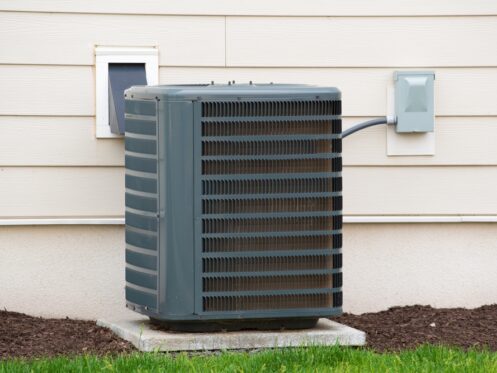Your air conditioner works hard to keep your home cool, using electricity to power the compressor, fan, and other key components. While energy usage is the trade-off you pay for a cool home, it doesn’t mean you have to sacrifice efficiency.
In this guide, we’ll explore how much energy each type of unit uses to determine if your air conditioner uses a lot of electricity. From central ACs to portable units, understanding the usage of each system helps you choose the best option for your home needs, budget, and environmental impact.
Central Air Conditioning Systems
Central air conditioning systems consume 2,000 to 5,000 watts per hour, with most using 600 to 1,500 kWh of electricity every month. These whole-home cooling systems cool air in one location and circulate it throughout your home using ductwork. While these systems use more energy than other units, they provide consistent, even cooling and are often the most effective option for larger homes.
Ductless Mini-Split Systems
Ductless mini-split systems are one of the most efficient ways to cool your home, with most units averaging 500 to 2,000 watts per hour. These high-efficiency systems often have SEER ratings over 18 and adjust cooling based on your needs. Their zoned cooling capabilities allow you to cool specific areas of your home without working the entire system, reducing energy consumption and utility costs.
Window Air Conditioning Units
Wondering how much power your window AC uses? These handy air conditioning systems use 500 to 2,500 watts per hour, depending on their size. Small units average 500 to 1,000 watts per hour, while large units use 1,500 or more. These AC units cool a single room or compact space, so you’ll often need more than one to cool your entire home. Depending on how many units you have, window ACs can use more electricity than other options, especially if you run them consistently.
Portable Air Conditioners
Portable air conditioners are the least efficient cooling system, with most averaging 3,000 to 4,000 watts per hour. They often lose cooled air through the exhaust hose, forcing them to work harder to maintain consistent temperatures and use more electricity than other AC units. They’re not ideal for long-term cooling, but they are convenient for temporary use or targeted spaces.
Factors Affecting AC Energy Consumption
Your air conditioner’s energy consumption depends on a combination of internal and environmental factors. Improper sizing, lack of maintenance, hot climates, and heavy use can lead to significantly higher energy use. Some of the key factors that influence its efficiency include:
- Size and capacity
- SEER rating
- Maintenance level
- Age
- Ductwork condition
- Outdoor temperature
- Humidity levels
- Usage
- Your location
Seasonal Energy Efficiency Ratio (SEER)
Every air conditioner has a SEER rating, which stands for Seasonal Energy Efficiency Ratio. These ratings represent how efficiently your air conditioner cools your home over a typical cooling season by dividing the total BTUs it provides by the number of watt-hours it consumes. All air conditioners must have a SEER of 13 to 24, with higher ratings representing greater efficiency.
The higher your air conditioner’s rating, the less energy it uses to cool your home, resulting in lower energy bills and a smaller environmental impact. For example, replacing a 13 SEER AC with a 20 SEER system could save you up to 50% on your monthly energy bills.
Knowing the SEER rating of your AC gives you a better idea of how much energy it will use throughout the cooling season and helps you make informed decisions about upgrades and replacements. Many states have minimum SEER rating requirements, so it’s important to check your local regulations to make sure your unit meets these standards.
Ways to Improve Energy Efficiency
Finding ways to improve your air conditioner’s energy efficiency can benefit your system, wallet, and the planet. By reducing your air conditioner’s energy usage, you’ll extend its lifespan, lower your monthly utility bills, and create a more sustainable home.
The best way to keep your air conditioner running efficiently is to schedule routine maintenance with an HVAC professional. During the appointment, a technician will inspect, clean, and service your system to keep it running in top condition. With annual tune-ups, you’ll reduce energy consumption, avoid breakdowns, and identify issues early on to prevent costly repairs down the line.
Along with professional tune-ups, some other ways to improve your AC’s energy efficiency include:
- Upgrading to an energy-efficient model: If you have an aging or poorly functioning AC, consider switching to a new, high-efficiency model to reduce energy consumption and improve your home’s comfort.
- Using a smart thermostat: Smart thermostats track your AC usage to adjust the temperature based on your schedule for maximum energy efficiency.
- Regularly changing the filters: Dirty or clogged filters cause your AC to work harder, using more energy to cool your home. Changing them every two to three months helps reduce the strain on your system and prevent excess energy use.
- Enhance your home’s insulation: Closing gaps around doors and windows, upgrading your insulation, and inspecting for ductwork leaks prevents air from escaping, limiting strain on your AC and reducing energy usage.
Contact the Team at High 5 for All Your AC Installation & Repair Needs!
If you’re looking to reduce your air conditioner’s electricity usage, the team at High 5 is here to help. From high-efficiency upgrades and quick repairs to preventative maintenance, we offer all the HVAC services you need in one place. Our experts can recommend the best energy-saving solutions for your home, whether upgrading to a high-SEER unit, optimizing your thermostat settings, or repairing inefficient ductwork.
Call us to schedule your appointment today and discover why we’re the leading HVAC contractor for Denver residents.

